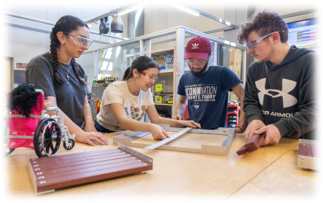From Personal Challenge to Community Solution
Three years ago, I stood on the edge of my front steps in Connecticut, staring at the three metal stairs that had never felt so tall. A recent diagnosis had begun chipping away at my mobility—first a cane, sometimes a walker, and now this: a creeping dread that someday soon, I might not be able to leave my own home.
So, I started making calls. To aging agencies: "What programs exist for ramps?" To churches: "Do you have volunteers who build them?" To social services: "Is there funding?" The answers all blurred together: "It's not easy." "Waitlists are long." "Have you tried a GoFundMe?" One coordinator sighed and said, "Honestly, Mr. Wiggin, most folks just… give up and move." I had already moved when I lost my wife. I wasn't going to move again.
That's when it hit me: If it's sound fiscal and moral policy to keep seniors in their homes, why is there no solid plan to let us enter and leave them safely?
The Spark
I've never been one to sit still. So, I started digging. I learned that 25 million Americans face mobility challenges, yet 80% of low-income households can't afford ramps. I read about plastic waste—how the U.S. recycles just 5% of its 42 million tons of annual plastic trash. And then, one gray afternoon, I met Dr. Edith Barrett.
Edith, a professor emeritus of public policy at UConn, had spent her career studying systemic failures. Over coffee and iced tea, I vented: "Why are we letting people become prisoners in their homes while landfills overflow with materials that could help them?" She leaned forward, eyes sharp. "Bill," she said, "what if we stopped asking 'why' and started building 'how'?"
That conversation became the Earth Friendly Project.
How We're Building "How"
Today, we're in the messy, hopeful throes of prototyping. Our Eco-Entry Ramp isn't finished—it's a work in progress, a skeleton of what could be. But here's the vision: modular units made entirely from recycled plastic bottles, designed to be affordable, ADA-compliant, and assembly-friendly. No contractors' hefty price tags. Just sturdy, modular-assembly pieces, diverting 200 pounds of plastic waste per ramp from landfills.
Right now, our prototype is being stress-tested by UConn engineers. I've watched students take melted-down milk jugs and soda bottles, molding them into slabs that'll hold weight, weather storms, and outlast traditional materials. Every time I look at those prototype ramp sections I see my own front steps. I see the millions of people like me, clinging to independence.
Why This Isn't Just About Ramps
This project is a rebellion. Against a world where recycling feels futile. Against systems that tell seniors, veterans, and disabled folks to wait or settle. Against the lie that "sustainability" is a luxury.
We're not there yet. We're still tweaking molds, chasing grants, and pitching towns on the idea that plastic waste isn't garbage; it's raw material for dignity. But here's what keeps me going: Connecticut's 2040 Zero Waste mandate. The spark in a lawmaker's eye when we explain how ramps could align with federal infrastructure grants. The UConn students who've turned this into their capstone project, scribbling equations on whiteboards like it's a moon launch.
— Bill Wiggin, Co-Founder of the Earth Friendly Project




